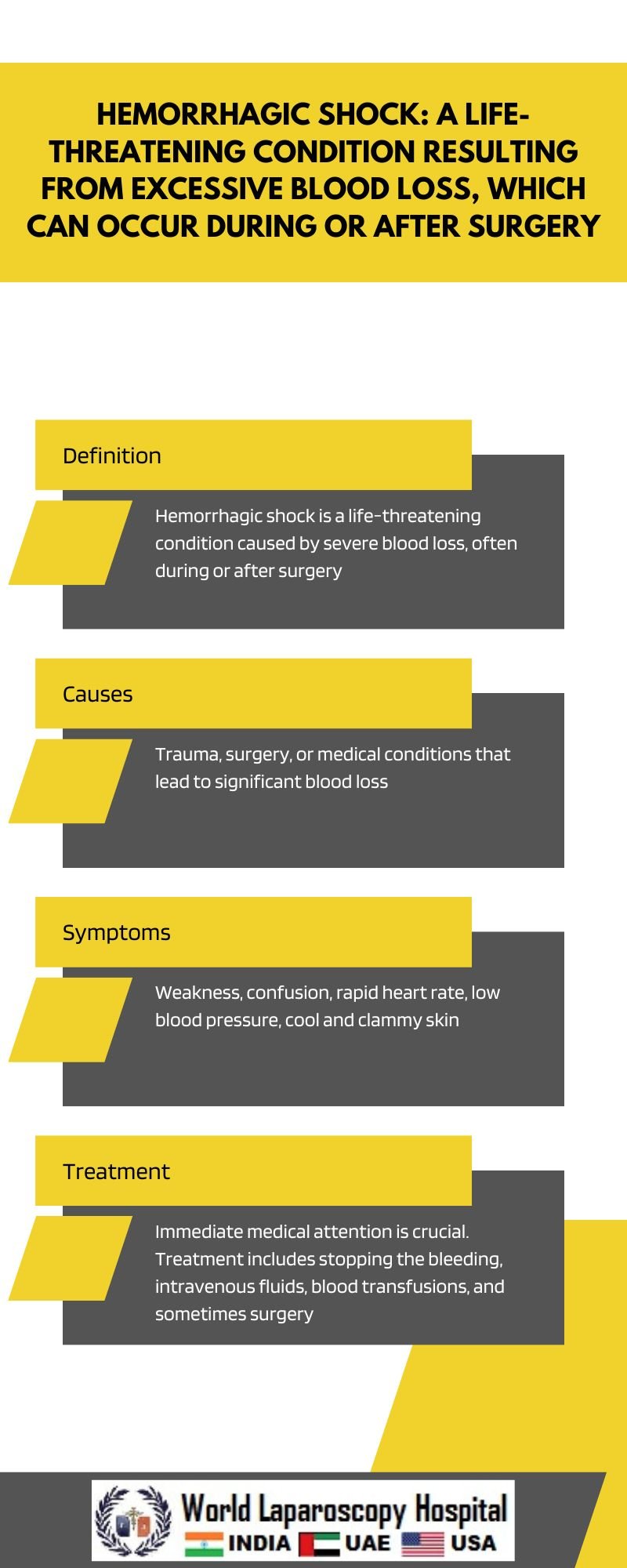Hemorrhagic shock: A life-threatening condition resulting from excessive blood loss, which can occur during or after surgery
Introduction
Hemorrhagic shock is a critical condition that occurs when there is severe blood loss, leading to inadequate perfusion of vital organs and tissues. It is a medical emergency that requires immediate intervention to prevent organ failure and death. Hemorrhagic shock can occur in various situations, including traumatic injuries, surgeries, gastrointestinal bleeding, and other medical conditions. In this article, we will explore the causes, symptoms, diagnosis, and treatment of hemorrhagic shock, with a focus on its occurrence during or after surgery.

Understanding Hemorrhagic Shock
Hemorrhagic shock is characterized by a rapid and significant loss of blood, which impairs the body's ability to deliver oxygen and nutrients to tissues and organs. This can lead to cellular dysfunction, organ failure, and ultimately death if not promptly treated. The severity of hemorrhagic shock is determined by the amount of blood loss and the body's compensatory mechanisms.
Causes of Hemorrhagic Shock
Hemorrhagic shock can be caused by various factors, including:
Traumatic injuries:Severe injuries, such as those sustained in car accidents, falls, or gunshot wounds, can lead to significant blood loss and hemorrhagic shock.
Surgical complications:
Hemorrhagic shock can occur during or after surgery due to complications such as uncontrolled bleeding or damage to blood vessels.
Gastrointestinal bleeding:
Conditions such as peptic ulcers, esophageal varices, or inflammatory bowel disease can lead to severe bleeding and hemorrhagic shock.
Medical conditions:
Certain medical conditions, such as hemophilia, liver disease, or vascular abnormalities, can increase the risk of hemorrhagic shock.
Symptoms of Hemorrhagic Shock
The symptoms of hemorrhagic shock can vary depending on the severity of the blood loss. Common symptoms include:
- Rapid heart rate (tachycardia)
- Low blood pressure (hypotension)
- Pale, cool, clammy skin
- Rapid, shallow breathing
- Weakness, dizziness, or fainting
- Confusion or disorientation
- Thirst
- Decreased urine output
Diagnosis of Hemorrhagic Shock
Diagnosing hemorrhagic shock typically involves a combination of clinical evaluation, medical history review, and diagnostic tests. The healthcare provider will assess the patient's vital signs, including heart rate, blood pressure, and oxygen saturation. Blood tests may be performed to assess the extent of blood loss and evaluate organ function. Imaging studies, such as ultrasound or CT scans, may be used to identify the source of bleeding.
Treatment of Hemorrhagic Shock
The treatment of hemorrhagic shock aims to stabilize the patient's condition, stop the bleeding, and restore blood volume. Treatment options may include:
Fluid resuscitation:Intravenous fluids are administered to restore blood volume and improve tissue perfusion.
Blood transfusion:
If the patient has lost a significant amount of blood, a blood transfusion may be necessary to replace lost red blood cells.
Medications:
In some cases, medications such as vasoconstrictors or coagulation factors may be used to control bleeding and improve blood pressure.
Surgical intervention:
In cases of severe bleeding, surgery may be required to repair damaged blood vessels or organs.
Monitoring and supportive care:
The patient is closely monitored in the intensive care unit (ICU) and provided with supportive care to prevent complications and promote recovery.
Prevention of Hemorrhagic Shock
Preventing hemorrhagic shock involves identifying and addressing the underlying causes of bleeding. This may include:
Avoiding risky behaviors:Taking precautions to prevent traumatic injuries, such as wearing seat belts and helmets.
Managing medical conditions:
Proper management of medical conditions that increase the risk of bleeding, such as liver disease or hemophilia.
Timely treatment:
Seeking prompt medical attention for conditions that can lead to bleeding, such as peptic ulcers or gastrointestinal bleeding.
Surgical precautions:
Ensuring proper surgical technique and monitoring during surgery to prevent complications and excessive bleeding.
Conclusion
Hemorrhagic shock is a life-threatening condition that requires prompt recognition and intervention. It can occur in various situations, including traumatic injuries, surgeries, and medical conditions. Early diagnosis and treatment are crucial for improving outcomes and preventing complications. By understanding the causes, symptoms, diagnosis, and treatment of hemorrhagic shock, healthcare providers can effectively manage this critical condition and improve patient outcomes.
| Older Post | Home | Newer Post |

